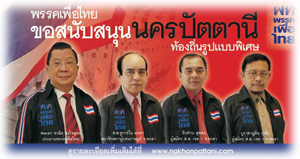With the Nakhon Pattani plan dumped, now what?
 Gen Chavalit Yongchaiyudh appears to have been given a big slap in the face by the Pheu Thai Party. During the debate on the government's policy statement last week.
Gen Chavalit Yongchaiyudh appears to have been given a big slap in the face by the Pheu Thai Party. During the debate on the government's policy statement last week.
Democrat MPs, including Chuan Leekpai and Chamni Sakdiseth, took the floor to grill the government over its policy on the three southernmost provinces, especially the Nakhon Pattani or Maha Nakhon Pattani special administration which was highlighted by the Pheu Thai Party during the July 3 election campaign.
The Democrat MPs had a valid point to question the government's policy for the restive far South. The policy statement only briefly mentioned that the government would promote a local administration model which corresponds with geographic characteristics. What does that mean exactly?
Deputy Prime Minister and Interior Minister Yongyuth Wichaidit, who is also Pheu Thai Party leader, told the parliament that the proposed Nakhon Pattani special administration was the idea of just one person and not that of the Pheu Thai Party. He went on to say that the government would overhaul the Southern Border Provinces Administration Centre to pave the way for more public participation in the administration and governance of the restive region.
Mr Yongyuth was polite enough not to mention Gen Chavalit's name as the latter has already resigned as the party's chairman since April. But for anyone who has followed up the Nakhon Pattani idea, it was understood that Mr Yongyuth referred to Gen Chavalit who floated the concept back in 2007 and it has been on and off ever since. Marking Constitution Day in 2009, a big seminar was held at the Pattani campus of Prince of Songkla university which brought in participants from 23 organisations, among them the Peace and Conflict Study Centre of Chulalongkorn University, the King Mongkut Institute, the Federation of Southern Muslim Students and the Islamic committees of Songkhla, Pattani, Yala and Narathiwat.
 Mr Yongyuth's claim that the Nakhon Pattani concept was not endorsed by the Pheu Thai Party was untrue. On the contrary, the concept was the party's key message during the election campaign. Posters bearing Gen Chavalit's portrait in an army general's uniform and the Nakhon Pattani concept were put up throughout the three southernmost provinces. Moreover, the party has already had a draft bill about the special administration body and this could not be done by Gen Chavalit alone without the party's support.
Mr Yongyuth's claim that the Nakhon Pattani concept was not endorsed by the Pheu Thai Party was untrue. On the contrary, the concept was the party's key message during the election campaign. Posters bearing Gen Chavalit's portrait in an army general's uniform and the Nakhon Pattani concept were put up throughout the three southernmost provinces. Moreover, the party has already had a draft bill about the special administration body and this could not be done by Gen Chavalit alone without the party's support.
The reason the Pheu Thai Party does not have anything to do with the concept anymore may stem from the fact that the party was roundly defeated in the election in the three southernmost provinces. The party did not win a single House seat down there and several critics quickly concluded that the defeat was because the voters didn't want the Nakhon Pattani idea _ an interpretation which is too simplistic.
The party's crushing defeat in the far South might be due to several factors, not necessarily the Nakhon Pattani issue. That many voters there still harbour bitter memories of the Krue Se and Tak Bai tragedies which took place during the Thaksin administration may be one of the factors.
It is a pity that the Nakhon Pattani concept and its related draft bill were unceremoniously ditched at the last minute, leaving the government without any concrete policy for the deep South besides the plan to overhaul the SBPAC as stated by Mr Yongyuth to allow greater public participation in the administration.
The government's approach to overhaul the SBPAC amounts to a step backward as the administration and governance of the three southernmost provinces still remains largely centralised. This may not reflect the political aspirations of the predominantly Malay Muslim people who comprise more than 85% of the population who have yearned for greater self-determination in the administration and management of natural resources.
the three southernmost provinces still remains largely centralised. This may not reflect the political aspirations of the predominantly Malay Muslim people who comprise more than 85% of the population who have yearned for greater self-determination in the administration and management of natural resources.
If the public interest in the Nakhon Pattani concept as manifested in the various public discussions staged in the region in the past few years, including the big seminar staged two years ago in Pattani, is to be used as a barometer, it can be assumed that mere overhauling of the SBPAC may not be sufficient to meet the people's political aspirations.
The government will need more time to rethink and to come up with a more clear-cut and realistic policy for the deep South.
